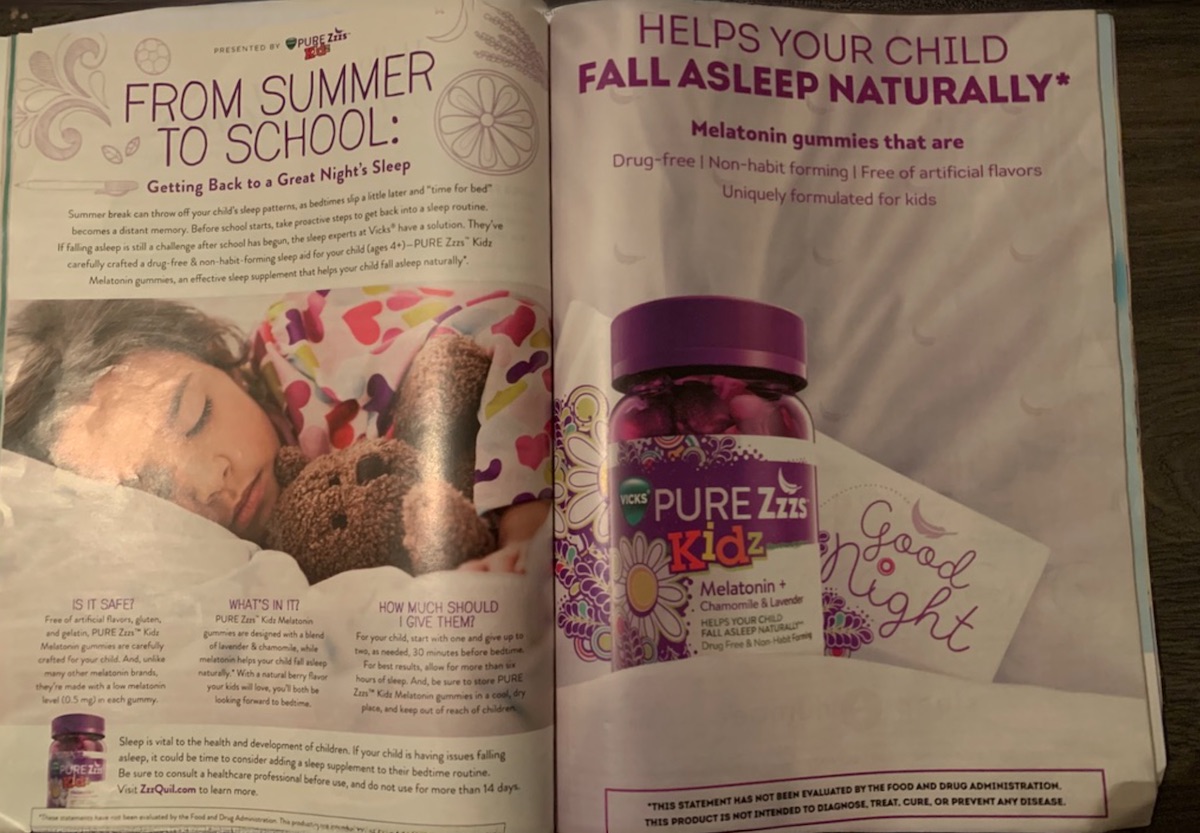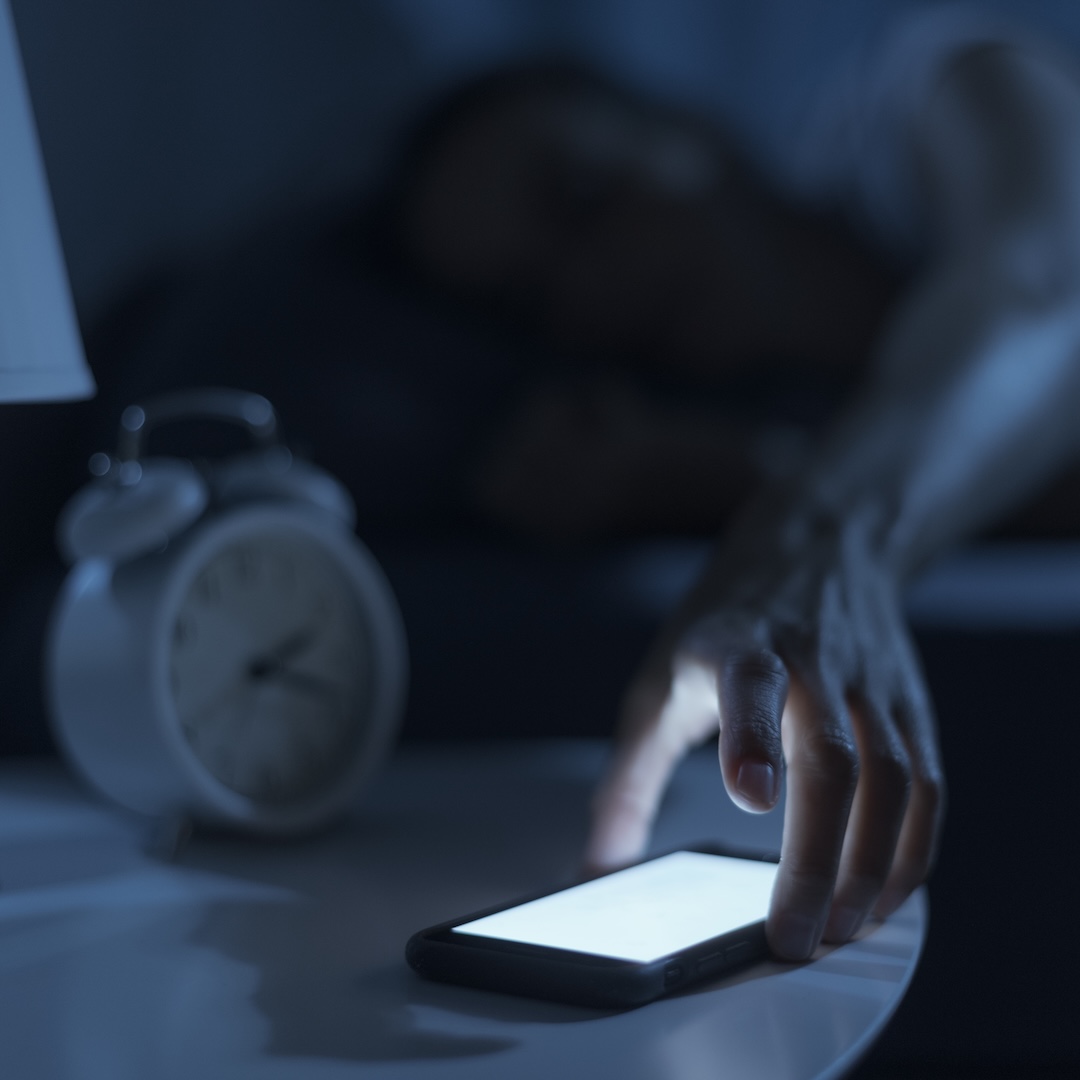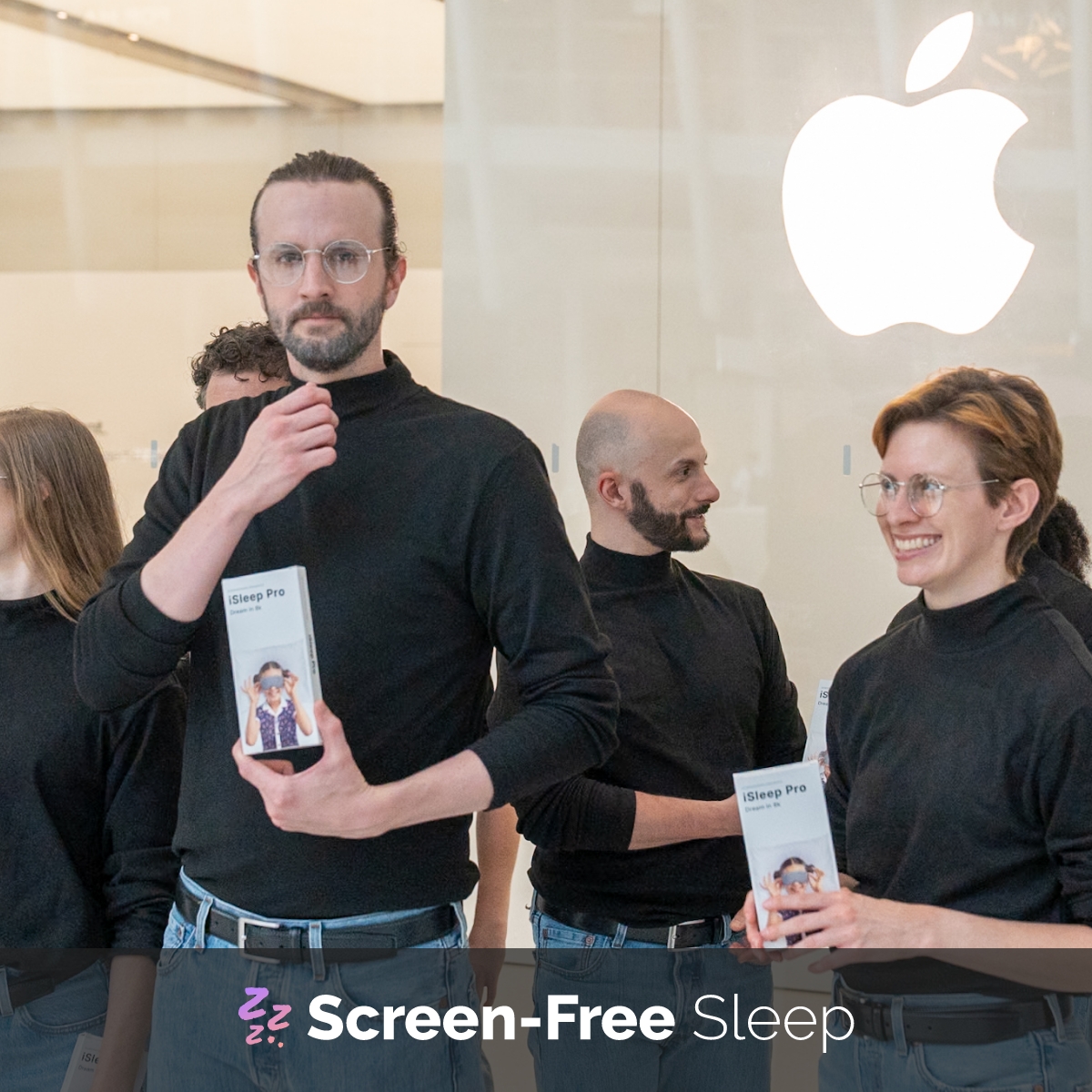



Have you ever read a magazine in a dentist's chair, and it made you want to jump out of the chair? That is what happened to me when I saw the ad, which is the photo of today’s blog.
I was completely shocked that people in the industry would have the nerve to imply that taking a drug is how a small child “sleeps naturally.”
What a horrible message to spread because it has a serious risk of creating the belief that a pill/gummy/something ingested is needed to sleep — which is one among several risks associated with creating a psychological dependence.
Another concern is the specific ingredient in that particular gummy: Melatonin. While there are already known issues with its use, the long-term effects on children remain largely unknown.
Yesterday, we released my latest Podcast titled, “The Sleep Crisis: Addressing Melatonin and Tech As Sleeping Aids.” Below, I share a few key points from the podcast, but as always, I hope you will tune into it.
Are you wondering how melatonin relates to screen time / Screenagers? Let me explain...
1. Our tech revolution impacts a child's or teen's routine to prepare for sleep, There are healthy habits and risky ones. In today's blog, I discuss melatonin and also the issue of using a tech-dependent activity to fall asleep.
2. The fact that ads for melatonin and everything else show up in so many more places in our lives than any time before.
3. It’s important to give our kids and teens some media literacy around how they are getting marketed to. Show your teen the ad in this picture and point out its claims. How can they say it does not cause dependency!? True in the short term the child may only cry if they don’t get their candy-flavored gummy. But what about dependency over the long term?
4. This issue also ties into screen time, as parents now face the challenge of getting their kids to fall asleep amid the stimulating activities made possible by interactive screens. I don’t fault parents for wanting help when it comes to their kids and sleep time. All of this makes parents particularly susceptible to ads claiming to help their children sleep. (By the way, the effectiveness of melatonin, beyond the placebo effect, hasn’t been definitively proven in scientific literature.)
Learn more about showing our movies in your school or community!
Join Screenagers filmmaker Delaney Ruston MD for our latest Podcast

Learn more about our Screen-Free Sleep campaign at the website!
Our movie made for parents and educators of younger kids
Learn more about showing our movies in your school or community!
Below are two highlights from the 25-minute podcast episode: the risks associated with melatonin use, and the challenges of using technology to fall asleep, along with safer solutions.
In this section, I talk with Dr. Judy Owens, a professor of neurology at Harvard Medical School who has been researching sleep for children and adolescents for 25 years.
Me: Let's talk a little bit more about melatonin and biology. Like, the impact of it on youth biology. What do we know, and what do we not know?
Judy Owens: We know that melatonin actually has an effect on reproductive hormones. So in other words, hormones increase around the time of puberty. And so, the evidence is a bit mixed right now, and there aren't a lot of studies.
Suggesting that there may be some impact on pubertal development of melatonin. Melatonin in humans could potentially have two different effects. It could delay the onset or the beginning of puberty development because it has these suppressing effects on reproductive hormones, or alternatively, if you stop Melatonin use in a prepubertal child.
In other words, like a young child that hasn't yet gone through puberty, you could actually trigger them into early puberty.
Me: Can we see that with animal models?
Judy Owens: Yes, we have data in animal models that suggests that melatonin has these effects. We don't have that evidence yet in humans, but I think, given how common the use of melatonin is in young kids, that's something that we really need to monitor.
Some children really like to listen to music or a story online to fall asleep. However, there are real risks of having tech in children’s rooms, particularly ones they can control, because, over time, they may start to interact with the device and stay up later.
In the pod, I say the following:
Me: If you have a young person who, for example, falls asleep with music, ideally, you could use a Bluetooth type of a situation that could pipe in music into their room could be helpful, but the key is not having electronics that they are in control of that they might end up using through the night or be tempted to or have those issues that we've been talking about.
Really trying more soothing things, helping them to learn how to self-soothe, self-relax at bedtime, whether that's reading a book, which sometimes can be really activating for young people. So, you have to see what works for your child. Sometimes parents will have the kid read a book that they've already read, or listen to a book on tape that they've already read.
Of course, there's journaling, writing a story, or doodling. We want to find other ways to help young people to fall asleep.
Questions to get the conversation started today with your family or group.
Learn more about showing our movies in your school or community!
Join Screenagers filmmaker Delaney Ruston MD for our latest Podcast

Learn more about our Screen-Free Sleep campaign at the website!
Our movie made for parents and educators of younger kids
Learn more about showing our movies in your school or community!
Be sure to subscribe to our YouTube Channel! With new ones added regularly, you'll find over 100 videos covering parenting advice, guidance, podcasts, movie clips and more. Here's our latest!
As we’re about to celebrate 10 years of Screenagers, we want to hear what’s been most helpful and what you’d like to see next.
Please click here to share your thoughts with us in our community survey. It only takes 5–10 minutes, and everyone who completes it will be entered to win one of five $50 Amazon vouchers.

Have you ever read a magazine in a dentist's chair, and it made you want to jump out of the chair? That is what happened to me when I saw the ad, which is the photo of today’s blog.
I was completely shocked that people in the industry would have the nerve to imply that taking a drug is how a small child “sleeps naturally.”
What a horrible message to spread because it has a serious risk of creating the belief that a pill/gummy/something ingested is needed to sleep — which is one among several risks associated with creating a psychological dependence.
Another concern is the specific ingredient in that particular gummy: Melatonin. While there are already known issues with its use, the long-term effects on children remain largely unknown.
Yesterday, we released my latest Podcast titled, “The Sleep Crisis: Addressing Melatonin and Tech As Sleeping Aids.” Below, I share a few key points from the podcast, but as always, I hope you will tune into it.
Are you wondering how melatonin relates to screen time / Screenagers? Let me explain...
1. Our tech revolution impacts a child's or teen's routine to prepare for sleep, There are healthy habits and risky ones. In today's blog, I discuss melatonin and also the issue of using a tech-dependent activity to fall asleep.
2. The fact that ads for melatonin and everything else show up in so many more places in our lives than any time before.
3. It’s important to give our kids and teens some media literacy around how they are getting marketed to. Show your teen the ad in this picture and point out its claims. How can they say it does not cause dependency!? True in the short term the child may only cry if they don’t get their candy-flavored gummy. But what about dependency over the long term?
4. This issue also ties into screen time, as parents now face the challenge of getting their kids to fall asleep amid the stimulating activities made possible by interactive screens. I don’t fault parents for wanting help when it comes to their kids and sleep time. All of this makes parents particularly susceptible to ads claiming to help their children sleep. (By the way, the effectiveness of melatonin, beyond the placebo effect, hasn’t been definitively proven in scientific literature.)
Below are two highlights from the 25-minute podcast episode: the risks associated with melatonin use, and the challenges of using technology to fall asleep, along with safer solutions.
In this section, I talk with Dr. Judy Owens, a professor of neurology at Harvard Medical School who has been researching sleep for children and adolescents for 25 years.
Me: Let's talk a little bit more about melatonin and biology. Like, the impact of it on youth biology. What do we know, and what do we not know?
Judy Owens: We know that melatonin actually has an effect on reproductive hormones. So in other words, hormones increase around the time of puberty. And so, the evidence is a bit mixed right now, and there aren't a lot of studies.
Suggesting that there may be some impact on pubertal development of melatonin. Melatonin in humans could potentially have two different effects. It could delay the onset or the beginning of puberty development because it has these suppressing effects on reproductive hormones, or alternatively, if you stop Melatonin use in a prepubertal child.
In other words, like a young child that hasn't yet gone through puberty, you could actually trigger them into early puberty.
Me: Can we see that with animal models?
Judy Owens: Yes, we have data in animal models that suggests that melatonin has these effects. We don't have that evidence yet in humans, but I think, given how common the use of melatonin is in young kids, that's something that we really need to monitor.
Some children really like to listen to music or a story online to fall asleep. However, there are real risks of having tech in children’s rooms, particularly ones they can control, because, over time, they may start to interact with the device and stay up later.
In the pod, I say the following:
Me: If you have a young person who, for example, falls asleep with music, ideally, you could use a Bluetooth type of a situation that could pipe in music into their room could be helpful, but the key is not having electronics that they are in control of that they might end up using through the night or be tempted to or have those issues that we've been talking about.
Really trying more soothing things, helping them to learn how to self-soothe, self-relax at bedtime, whether that's reading a book, which sometimes can be really activating for young people. So, you have to see what works for your child. Sometimes parents will have the kid read a book that they've already read, or listen to a book on tape that they've already read.
Of course, there's journaling, writing a story, or doodling. We want to find other ways to help young people to fall asleep.
Questions to get the conversation started today with your family or group.
Be sure to subscribe to our YouTube Channel! With new ones added regularly, you'll find over 100 videos covering parenting advice, guidance, podcasts, movie clips and more. Here's our latest!
Sign up here to receive the weekly Tech Talk Tuesdays newsletter from Screenagers filmmaker Delaney Ruston MD.
We respect your privacy.

Have you ever read a magazine in a dentist's chair, and it made you want to jump out of the chair? That is what happened to me when I saw the ad, which is the photo of today’s blog.
I was completely shocked that people in the industry would have the nerve to imply that taking a drug is how a small child “sleeps naturally.”
What a horrible message to spread because it has a serious risk of creating the belief that a pill/gummy/something ingested is needed to sleep — which is one among several risks associated with creating a psychological dependence.
Another concern is the specific ingredient in that particular gummy: Melatonin. While there are already known issues with its use, the long-term effects on children remain largely unknown.
Yesterday, we released my latest Podcast titled, “The Sleep Crisis: Addressing Melatonin and Tech As Sleeping Aids.” Below, I share a few key points from the podcast, but as always, I hope you will tune into it.
Are you wondering how melatonin relates to screen time / Screenagers? Let me explain...
1. Our tech revolution impacts a child's or teen's routine to prepare for sleep, There are healthy habits and risky ones. In today's blog, I discuss melatonin and also the issue of using a tech-dependent activity to fall asleep.
2. The fact that ads for melatonin and everything else show up in so many more places in our lives than any time before.
3. It’s important to give our kids and teens some media literacy around how they are getting marketed to. Show your teen the ad in this picture and point out its claims. How can they say it does not cause dependency!? True in the short term the child may only cry if they don’t get their candy-flavored gummy. But what about dependency over the long term?
4. This issue also ties into screen time, as parents now face the challenge of getting their kids to fall asleep amid the stimulating activities made possible by interactive screens. I don’t fault parents for wanting help when it comes to their kids and sleep time. All of this makes parents particularly susceptible to ads claiming to help their children sleep. (By the way, the effectiveness of melatonin, beyond the placebo effect, hasn’t been definitively proven in scientific literature.)

Many adults keep their phones by the bed — it feels harmless, even necessary. But what if that habit is quietly affecting our sleep and the example we set for our kids? In this week’s blog, Dr. Ruston shares two key things every parent should know about sleeping next to a phone, and how small nighttime tech changes can make a big difference for the whole family.
READ MORE >
From Call of Duty and Grand Theft Auto to violence and gunfire in movies and shows, aggression is a constant backdrop in boys’ media diets. And with various influencers and online personalities framing success through the lens of strength, competition, dominance and winning, boys are being handed a narrow script for masculinity. As parents, one of the most important things we can do is offer a counterweight. We can help boys strengthen empathy, compassion, and respect as core traits of masculinity, so they have a broader, healthier vision of who they can become.
READ MORE >
Last week we introduced you to our Screen-Free Sleep campaign! Since then, we’ve been flooded with emails and calls, and most are asking the same question: How can we get this spreading in our school? Today’s blog has the answers.
READ MORE >for more like this, DR. DELANEY RUSTON'S NEW BOOK, PARENTING IN THE SCREEN AGE, IS THE DEFINITIVE GUIDE FOR TODAY’S PARENTS. WITH INSIGHTS ON SCREEN TIME FROM RESEARCHERS, INPUT FROM KIDS & TEENS, THIS BOOK IS PACKED WITH SOLUTIONS FOR HOW TO START AND SUSTAIN PRODUCTIVE FAMILY TALKS ABOUT TECHNOLOGY AND IT’S IMPACT ON OUR MENTAL WELLBEING.
